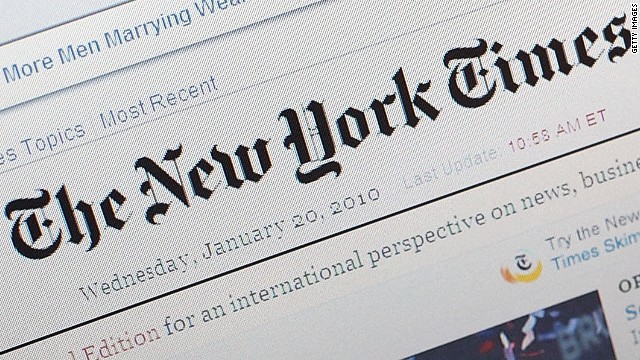China blocks New York Times website after story on leader's family wealth
October 26, 2012 -- Updated 1439 GMT (2239 HKT)

Chinese authorities blocked access to the English and Chinese websites of The New York Times on Friday, October 26, 2012.
-
Citing corporate and regulatory records, The Times said
it had pieced together evidence showing that Wen's relatives have
controlled assets worth at least $2.7 billion, often hiding their names
"behind layers of partnerships and investment vehicles involving
friends, work colleagues and business partners."
China reacted angrily to
the report, preventing people inside the country from visiting the two
Times websites or searching for the terms "New York Times" and "Wen
Jiabao" on popular social media platforms.
"It's trying to blacken
China's image and has ulterior motives," Chinese Foreign Ministry
spokesman Hong Lei said in a response to a question about the article,
which mentioned Wen's son, daughter, younger brother and brother-in-law
as being among those who had grown rich during Wen's time in power.
Asked about the decision
to block the websites, Hong replied: "China regulates the Internet in
accordance with laws and regulations."
The Chinese government
tries aggressively to control the flow information inside its borders
about sensitive topics like unrest in Tibetan areas and criticism of
senior officials. It strictly manages the output of domestic news media
outlets and has a history of shutting off access to international news
websites.
Chinese authorities have
blacked out the broadcast signal for international television stations
like CNN and the BBC when they have aired sensitive reports about the
country.
The Times story about
Wen's family's wealth comes at a particularly delicate time for the
ruling Communist Party, only a matter of weeks before the start of the
18th Party Congress, at which the country's next set of top leaders will
be announced.
-
Authorities have stepped
up security in Beijing, where the congress, part of a once-in-a-decade
leadership transition, will take place. This transfer of power has
already been complicated by the dramatic and damaging scandal involving the former high-flying official Bo Xilai and his inner circle.
-
In a country where
official corruption is widespread, the top leadership is particularly
sensitive to suggestions that its members or those close to them have
become unusually wealthy. The growing divide between rich and poor after
two decades of torrid economic growth has added to that defensiveness.
-
The Times article on the wealth of Wen's relatives comes four months after Bloomberg News reported
that the extended family of Vice President Xi Jinping, the presumptive
next top leader of China, had accumulated business interests worth
hundreds of millions of dollars during his rise up the Communist Party
ladder.
Chinese authorities cut
off access to the Bloomberg News website following publication of the
article, which was also based on public documents.
The blocking of the
Times websites Friday also takes place four months after the
introduction of the Chinese-language site, which the company said at the
time was "intended to draw readers from the country's growing middle
class" through a mixture of reporting by Chinese journalists and Times
articles translated from English.
-
The Times cited a company spokeswoman as expressing disappointment Friday that web access had been cut off.
"We hope that full
access is restored shortly, and we will ask the Chinese authorities to
ensure that our readers in China can continue to enjoy New York Times
journalism," said Eileen Murphy, according to The Times. "We will
continue to report and translate stories applying the same journalistic
standards that are upheld across The New York Times."
The servers that host
both the English and Chinese sites of the Times are outside mainland
China, according to the news organization.
-
CNN's Steven Jiang in Beijing contributed to this report.

1 comment:
I have been browsing online more than 3 hours nowadays, but I by no means found any
interesting article like yours. It's pretty
value sufficient for me. In my view, if all site owners and bloggers made just right content as you did, the net will probably be
much more helpful than ever before.
Here is my siteat free skype credit
Post a Comment